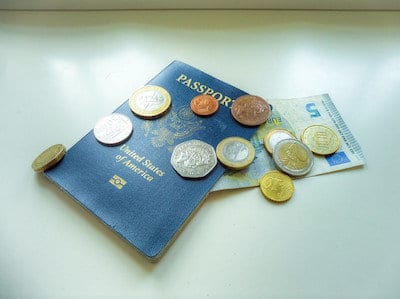 A travel budget becomes more than simply calculating spending versus savings when you take an extended trip, especially if you’re a citizen of a country like the United States that requires you to pay taxes whether or not you happen to be there. My live chat guest today can help you understand what’s required of you, plus what you might be able to deduct if you take a career break or RTW trip.
A travel budget becomes more than simply calculating spending versus savings when you take an extended trip, especially if you’re a citizen of a country like the United States that requires you to pay taxes whether or not you happen to be there. My live chat guest today can help you understand what’s required of you, plus what you might be able to deduct if you take a career break or RTW trip.
Tom Corley is a Certified Public Accountant (CPA), Certified Financial PLanner (CFP), and holds a Master’s Degree in Taxation. Tom is also the author of the bestselling book Rich Habits – The Daily Success Habits of Wealthy Individuals and the soon to be released, Rich Kids – How to Raise Our Children to be Happy and Successful in Life.
The chat is open today, Tuesday May 6th from 7:30pm-10:30pm US EST, ask away!
Tom and I will be online this evening to clear up any questions you may have about how to file, the taxes required of you, and yes, how to get a bigger return using parts of your trip as deductions. Someone should also ask if there’s any way to get out of paying taxes at all or at the very least, avoid double taxation when earning income in another country. We’re waiting for any questions you may have in the comments below!












Hi everyone, Tom will be stopping by in about an hour or so but you can begin leaving your questions now.
I’m here if you have any questions.
Hi Tom, welcome.
Not seeing any new replies in a while Anil. Ok to sign off or do you want me to hang until 10:30?
Hi Tom, thank you for spending part of your evening with all of us. We can begin wrapping things up and hope to do this again some time in the future.
where do i connect? on this site or somewhre else?
Hi Lee, you’re in the right place. Leave your questions anywhere in this thread.
thank you, so use to audio chats i thought i had missed something!
No problem – I like the old school text based style 😉
i expect this is an email ‘chat’, therefore my question is: in additiona to filing taxes yearly how do you manage your investments long distance? i am considering hiring a bonded accountant who will pay my bills and receive all my mail. the hope is he will notify me if there is something i must andle
You should make sure you have virtual access to your investments. If you are invested in mutual funds, in December most funds post the capital gains. If you have significant capital gains (generally taxed as ordinary income) you could find yourself underpaid for taxes and may need to make an estimated tax payment by 1/15 of the following year. You should be in contact with your accountant during December, if you have gains, for this reason. Don’t leave it up to the accountant to contact you.
Do I have to, as a US citizen pay taxes even if I’m not in the country for an entire year? What if I earn income during my travels in a foreign country, do I have to report it?
If you are a citizen or permanent resident (i.e. green card) of the U.S. you must file U.S. taxes every year, no matter where your income is earned. The U.S. taxes worldwide income of citizens and permanent residents.
What if the income is already being taxed by another country?
If you qualify, you can claim a Foreign Earned Income Exclusion or a foreign tax credit.
Is there anything I can use as a tax deduction from traveling?
Travel expenses are deductible as long as they are business related. This includes unreimbursed busienss travel expenses associated with your job or your business. Travel includes, air, rail, taxis, lodging, tips, telephone, laundry, baggage fees, meals and entertainment. Meals are limited to 50%.
What about this 300 day rule? Or does such a thing exist, as in, if I’m not in the US for most of the year, taxes aren’t applicable to me.
U.S. taxes are applicable to everyone who is a U.S. citizen or permanent resident. There are two tests that make you eligible for the Foreign Earned Income Exclusion:Test #1 Foreign Resident Test and Test #2 Physical Presence Test. The 330 days you are referring to relate to the Physical Presence Test. If you are on foreign soil for 330 days during any 12 month period you qualify for a portion of the Foreign Earned Income Exclusion, which is $99,200 in 2014. You would also qualify for the Foreign Housing Exclusion, once you meet one of the two tests. This is $15,872 in 2014.
Is this consecutive days?
No. It does not have to be consecutive.
So, then I wouldn’t have to pya income tax on anything under $99,200?
Unreimbursed business-related travel is a miscellaneous itemized deduction (if employee) and must exceed 2% of your adjusted gross income in order to receive a tax benefit. The 2% is a threshold for miscellaneous itemized deductions.
JJ’s last question: In a perfect world yes. The US individual income tax system is calendar year based. If you were outside the US the entire calendar year then, yes, the entire $99,200 in foreign earned income would be excluded.
How should I report side blogging income?
If you are a U.S. citizen or permanent resident you could report those expenses as “other income” or, if you have related expenses (domain fees, registration fees etc.) include the income on a form Schedule C. Schedule C allows you to offset your income with the related expenses.
I meant “that income” not “those expenses”
i have been told that i have to ‘prove’ i have a business travel writing …..but although i get published the income is minimal….is there an amount that qualifies my travels as for ‘business’?
Business-related purpose is a facts and circumstance test. Establishing a “business purpose” requires that you show support that the expenses are related to some business income you are generating. It becomes difficult to prove a business purpose if your business income is insignificant.
whats your upcoming book about specifically?
Rich Kids – How to Raise Your Children to be Happy and Successful in Life is a follow-up to my book Rich Habits. Rich Kids includes over 100 parent-success mentoring strategies I uncovered in my 5-year study of the daily habits of the rich.
income: will that include pensions and social security or just the interest on investments and any work income?
It includes everything. If all you have is pension income, social security income and investment income, you would not be eligible for the foreign earned income exclusion but you would be able to reduce your Federal income tax by utilizing a foreign tax credit (“FTC”) formula. The FTC reduces your U.S. Federal income tax by an amount essentially equal to the foreign taxes you pay on the same income. It is not always a dollar for dollar reduction. If the foreign country tax is lower than the U.S. tax, your FTC will be limited to the lower foreign tax and you may still owe U.S. tax on that same income.
Do such situations increase audit risk?
I don’t think so. The IRS has initiatives they are focusing on right now. These include Self-employed attorneys, S-Corporations, individuals with significant income, to name a few.
I’m curious if there’s a single biggest mistake you could identify that you think frequent and long-term travelers might make with their taxes and finances in general.
Not keeping adequate records. Not just to support a travel deduction in the event of an IRS inquiry, but to actually know what you spent. Keeping detailed records is not just about defending against the IRS, it is about maximizing the deductions you are entitled to. If you don’t keep adequate records you could be missing out on some deductions. Having one credit card or ATM card that captures everything makes this less likely. If you deal in cash you could lose receipts and forget about a valid deduction.
will i continue to pay usa income taxes after I qualify for dual citizenship (Italy) in a second country?
Only if you renounce your U.S. citizen status.
This is an interesting point I’ve read about – Americans abroad renouncing citizenship to avoid paying taxes. Is there any logic pro or against doing this financially?
I think it makes sense if your new foreign country income tax rates are lower than the U.S. and you KNOW you are not going to come back to the U.S. to live. If you are making the effort to become a citizen of another country I would say you must have reconciled that you are going to stay in that country for the rest of your life.
I would consider long term travel (more than 6 months per year outside of one’s home country) a small minority of tax payers. Do you think such persons require special tax assistance? Or would a service like TurboTax be adequate?
I spent a large portion of my career in taxes and, in particular, expatriate taxation. I found it to be one of the most confusing aspects of individual taxation. Our former Treasury Secretary (who oversees the IRS dept) used Turbo Tax and filed an inaccurate return. It’s the old rule: junk in, junk out. A typical CPA files hundreds of tax returns a year. They know what they are doing. It’s worth the cost to hire an expert. It gives you peace of mind. Being oversees creates many stresses. Why not eliminate the added stress of tax compliance with a CPA.
How would you recommend someone living outside of the US find a good CPA?
Referrals from back home. Family and friends are the best source of referrals. In dealing with this complex issue of expatriate taxation, you might want to ask other expats colleagues who they use as a CPA
Is a photograph of a receipt enough evidence in case of an audit, or are physical copies required?
Recent court cases have allowed scanned pictures to be used and the IRS has acquiesced on this. I have not heard of any cases where phone pictures were accepted but it really is the same thing.
What are some of the best (and worst) habits of the rich?
Best: daily self-improvement (reading for education, career, success books, self-help), daily aerobic exercise, building relationships with other successful people, practiced optimism, practiced gratitude, saving, 5:1 Rule (listen for 5 minutes for every 1 minute of talking), not gambling, limiting junk food to < 300 calories a day, owning cars (most do not lease), eliminating limiting beliefs, understanding the definition of a goal (a goal and a wish are not the same to the wealthy), going after some long-term goal, limiting recreational T.V. and Internet use on a daily basis to less than one hour, mentoring others, creating their own unique type of luck, completing 70% of their to-do list, hello calls, life event calls, happy birthday calls, vetting their thoughts before they come out of their mouths. Worst Bad Habits: living beyond your means, not reading for education, watching too much T.V. and spending too much time on recreational Internet, surrounding yourself with Poverty Relationships, gambling too much, procrastination, not balancing checkbook, leasing a car, not listening, saying what's on your mind, negative thinking, negative emotions, not setting goals, not understanding the difference between a wish and a goal.
“saying what’s on your mind” << this is an interesting one as a worst habit as many would view it as the opposite. Can you elaborate as to why this is the case?
Exactly. My Aunt Peg used to brag that she always said what was on her mind. She dies poor and hardly anyone was at her funeral. I thought a lot about my Aunt when I uncovered this Poverty Habit. The rich vet everything that comes out of their mouths. They are in the business of making money and that requires that they build valuable relationships. When you say what’s on your mind you will hurt the feelings of others. People want to do business with people they like, trust and feel comfortable around. People who say what’s on their mind often inadvertently damage relationships; a big no no for rich people.
That is fascinating. It sounds something like a policy of selective honesty.
It’s the opposite of what I was taught. But, of course, we were poor most of my life. There are ways the rich get their point across without saying what’s on their mind. They just made it a habit to be mindful of how they say things to people. Instead of saying I disagree and here’s why they might say: “That’s an interesting view Anil. Have you thought about it this way?” They don’t necessarily avoid saying what needs to be said, they just make a habit of saying it in a way that does not insult the feelings of others.
could there be any benefit to registering my online business in one US state versus another?
You will be taxed on your income in the state you are a resident of, irrespective of where you register your legal entity. If you live in states with no income tax that’s the best scenario.
Then if I pay myself from the legal entity, can I avoid paying tax on the “income” earned there? Or does it simply still get taken from the legal entity?
A legal entity paying your from another state will not prevent your home state from taxing that income.
Any chance the US will follow some of the other developed countries in terms of (not) taxing expatriates living outside of their home country?
I don’t think so. The U.S. adopted the worldwide income system in 1913 and I don’t see them changing to a Water’s Edge system like some countries in Europe have and like Canada has.
Aside from the obvious (more income) is there any other reasoning behind using the worldwide income system?
It’s simple (no complicated apportionment required) and it allows the IRS to see 100% of your income, no matter where it’s earned. It is a much more sophisticated system in my opinion than the water’s edge system. It really is a “big brother is watching” system.
let’s say i can move to any country, any particular one to go to for the lowest taxes?
Here’s a few article links:
http://www.cnbc.com/id/48054006/page/1
http://www.forbes.com/sites/investopedia/2011/12/01/countries-with-the-highest-and-lowest-taxes/
http://en.wikipedia.org/wiki/List_of_countries_by_tax_rates
Can you let us know how you merged both travel and taxes in your personal and professional life?
For business I use my AMEX card to capture all of my expenses. I use my ATM card for all of my personal expenses. I try very hard to keep the two separate and not commingle the expenses on one card.
Do you have expertise in any other country outside of America?
Italy, France, Switzerland, Canada, Puerto Rico (even though PR = possession, they have their own tax system)
Forgot Mexico
How can I apply for the foreign earned income exclusion
When you file your income tax return there is a Form 2555 that you file along with the return, to elect the foreign earned income exclusion.
is there any way to not pay taxes when traveling permanently?
Not if you are a U.S. citizen or permanent resident.
What’s your travel schedule like and where have you been recently?
In 2013: Ireland, Arizona, Minnesota, Washington DC, Florida, Louisiana, Maryland, North Carolina, South Carolina
2014 so far: Washington D.C., Florida, Maryland. Plans for the rest of the year include Mexico, Florida again, Louisiana. My book-related work creates many travel opportunities.
Sounds wonderful. Any favorite cities?
New Orleans. I’m also fond of Pensicola, Florida. Delray Beach, Florida was nice.
What state do you work in?
New Jersey is my home state. But I have clients in about 20 states. I do almost all of my work out of my NJ offices.
How does US tax rate compare to other countries?
Our Corporate tax rates are among the highest. Individual income tax rates are considered low in comparison to other countries.
Hope you had a good chat guys. Sorry I missed it I’ve only just opened the e-mail. Mind you I’m in the UK so the time wouldn’t work for me.
As a Brit I do sympathise with your tax rules though for those who live out of the country. They get you every which way they can!
Sorry you missed the chat, I usually post the page earlier so other timezones can leave questions in advance. Hopefully next time – and perhaps Tom will check back on the thread if you have any follow up questions.